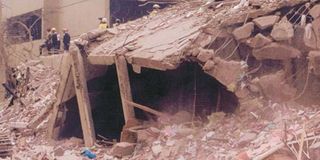EA bombing trial starts

A section of the US Embassy building in Nairobi after a terrorist attack August 7, 1998. The trial of an al-Qaeda suspect, Tanzanian Ahmed Ghailani, accused of bombing the embassy in Dar es Salaam started October 12, 2010 in New York. FILE
The al-Qaeda cell responsible for the US embassy bombing in Tanzania in 1998 also carried out the nearly simultaneous attack in Kenya, US prosecutors told a jury in New York on Tuesday.
“The attacks in Kenya and Tanzania were mirror images of one another,” assistant prosecutor Nicholas Lewin said in opening remarks in the trial of a Tanzanian charged with 224 counts of murder resulting from the explosions in Nairobi and Dar es Salaam.
Cell members often gathered in a clothing store in Mombasa, Kenya to plot the bombings, Mr Lewin said.
He added that the defendant, Ahmed Ghailani, travelled between Tanzania and Kenya. Frequent calls were made from Mr Ghailani's mobile phone to numbers in Kenya, the federal attorney said.
Mr Ghailani, 36, was captured in Pakistan in 2004. He had fled there along with four other bombing conspirators on the eve of the blasts in the two East African cities, Mr Lewin recounted.
He is charged specifically with buying the lorry used in the Dar attack, along with several gas tanks used to construct the bomb that killed 11 people on Friday, August 7, 1998, at 10:39 a.m.. The blast in Nairobi 10 minutes earlier killed 200 Kenyans and 12 Americans.
Mr Ghailani's trial opened nine years after the convictions in the same New York court of four men charged with involvement in both the Nairobi and Dar bombings. They are all serving life terms at a maximum-security US prison.
His defence attorneys will seek to portray Mr Ghailani as a dupe, who was unaware of the planned attacks, even though he assisted those who planned them.
"Ahmed Ghailani was often treated like a little brother. He was sent on errands” by his al-Qaeda associates, defence lawyer Steve Zissou said in opening remarks on Tuesday.
“He was with them, but he wasn't one of them.”
Mr Ghailani, who smiled and waved to spectators prior to the start of Tuesday's session, “was not really a man, but a boy” at the time of the 1998 bombings, Mr Zissou said.
“He was more comfortable playing with children, watching cartoons.”
The trial is being closely watched in the United States because Mr Ghailani is the first detainee from the US prison camp in Guantanamo Bay, Cuba, to be tried in a civilian court.
US leader Barack Obama's critics say that prisoners suspected of terrorist ties should have their cases heard by US military tribunals, which do not offer defendants the same safeguards as do criminal courts.




